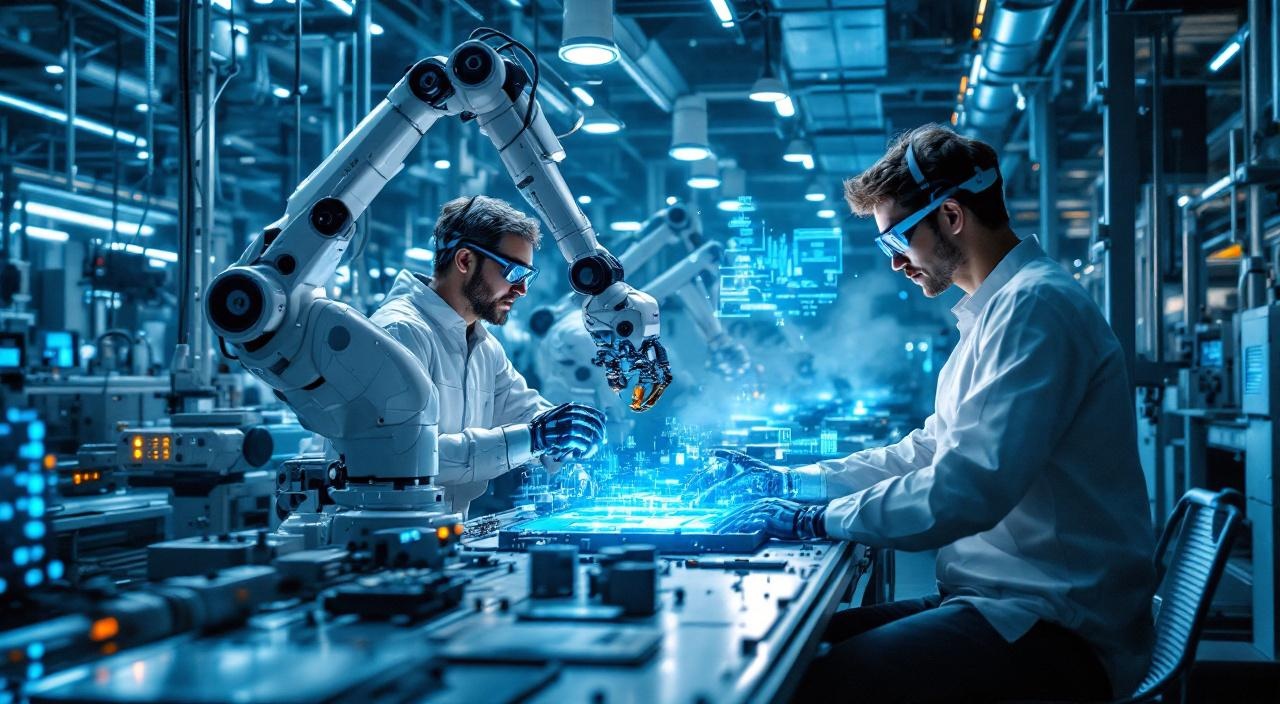The global AI revolution is reshaping industries at an unprecedented pace, with over 1 billion users worldwide driving a technological transformation that extends far beyond simple computational power. AI is surging through economic, social, and ethical landscapes, creating a profound shift that challenges traditional boundaries of innovation, productivity, and human potential.
Key Takeaways:
- AI adoption has skyrocketed, with 78% of companies actively using AI tools and 95% of professionals incorporating AI into their daily workflows
- The technology is creating a dual workforce dynamic, with 92 million jobs disappearing and 170 million new positions emerging by 2030
- Significant digital disparities exist, with high-income countries seeing 24% ChatGPT usage compared to just 0.7% in low-income nations
- Ethical considerations are paramount, requiring solid frameworks that address bias detection, transparency, and accountability
- Continuous learning and adaptability are critical for professionals handling the AI-transformed job market
I’ve watched this transformation unfold firsthand as both a physicist and a business consultant. The numbers don’t lie – we’re facing one of the most significant technological shifts of our lifetime. AI Disruption: Empowering Entrepreneurs & Revolutionizing Healthcare Today explores how these changes are already reshaping key industries.
Think about this: the 78% AI adoption rate among companies represents more than statistics; it reflects a fundamental change in how businesses operate. Many of my clients initially approached AI with skepticism, but now can’t imagine running their operations without it.
The job market statistics are particularly striking. Let that sink in. We’re looking at a net gain of 78 million jobs globally by 2030. But the transition won’t be smooth for everyone. The digital divide between high and low-income countries presents a serious challenge to equal opportunity in this new landscape.
Here’s the twist: I’ve found that businesses that embrace ethical AI implementation gain a competitive advantage through increased trust and reduced risk exposure. My work with small business owners consistently shows that addressing ethical concerns proactively leads to better outcomes.
For professionals concerned about job security, I recommend focusing on skills that complement AI rather than competing with it. AI Revolution: Entrepreneurs’ Survival Kit for the New Business Battleground provides practical strategies for thriving alongside these technologies.
Picture this: Instead of fearing AI displacement, envision yourself directing these powerful tools to handle routine tasks while you focus on creative problem-solving and relationship building. This mindset shift transforms AI from a threat to a powerful ally.
The good news? Those who adapt quickly will find extraordinary opportunities. I’ve guided numerous business owners through this transition, and those who embrace change consistently outperform competitors clinging to outdated methods.
Strange but true: Some of the most successful AI implementations I’ve seen come from small businesses with limited resources but unlimited curiosity and willingness to experiment. AI Automation Revolutionizes Small Biz: Unlock Efficiency & Growth Today! details several case studies worth reviewing.
But wait – there’s a catch: Implementing AI without proper strategy often leads to wasted resources and missed opportunities. The most successful businesses develop comprehensive plans that align AI initiatives with core business objectives.
For those just starting their AI journey, I suggest beginning with simple applications that address specific pain points. A Step by Step Plan to Build a Custom GPT for Beginners offers practical guidance for your first implementation.
Are you concerned about maintaining authenticity while leveraging AI? This challenge resonates with many of my clients. Your AI Content is Hurting Your Credibility – Here’s Why It Matters More Than Ever explores this tension and provides solutions.
Based on my experience transforming businesses across various sectors, I can tell you that the winners in this new economy won’t necessarily be those with the most advanced technology. Success will come to those who skillfully integrate AI into their existing operations while maintaining their unique human touch and ethical standards.
For more insights on navigating these changes and positioning your business for success, check out What Joe Habscheid’s Clients Have to Say about Him.
The Global AI Landscape: A Billion-User Revolution
I’ve witnessed many tech waves crash over the years, but nothing matches what’s happening right now. We’ve crossed a milestone that seemed impossible just a few years ago—over 1 billion people are now using AI globally in 2025.
The numbers tell a story that even surprises me. The AI market hit $391 billion this year, racing forward at a 31.5% annual growth rate. Here’s what caught my attention: 78% of companies are actively using AI tools, while 90% of organizations have adopted at least one AI solution.
The Human Side of AI Adoption
What fascinates me most isn’t the corporate statistics—it’s that 34% of adults report having significant AI awareness. That’s roughly one in three people who understand what AI can do for them. I remember when explaining AI meant starting with science fiction references. Now my neighbors ask about ChatGPT alternatives over coffee.
This isn’t just technology adoption—it’s cultural transformation happening at breakneck speed.

Productivity Unleashed: AI’s Industrial Metamorphosis
The productivity revolution isn’t coming—it’s already here. A staggering 95% of professionals now use AI to supercharge their daily workflows.
I’ve watched this transformation firsthand across industries. Healthcare leads the charge with 66% of U.S. physicians using AI for diagnostics, dramatically reducing misdiagnosis rates. Picture this: What once took radiologists hours now takes minutes.
Cross-Industry Revolution
The automotive sector projects $400 billion in self-driving vehicle revenue, while pharmaceutical companies slash drug development timelines from decades to years. Finance departments now catch fraud patterns humans miss entirely.
The Numbers Don’t Lie
Time savings and operational cost reductions are reshaping business fundamentals. Companies report 40-60% efficiency gains across routine tasks. AI Automation Revolutionizes Small Biz: Unlock Efficiency & Growth Today! shows how small businesses capture these benefits.
Strange but true: The biggest barrier isn’t technology—it’s adapting human processes fast enough to keep pace.

The Ethical Tightrope: Balancing Progress with Human Impact
Picture this: 92 million jobs disappearing by 2030 while 170 million new positions emerge. I’ve watched this transformation unfold firsthand in my own business ventures, where automation eliminated routine tasks but created demand for strategic thinking roles.
The numbers tell a sobering story. In high-income countries, 24% of internet users access ChatGPT, while low-income nations see only 0.7% usage. This digital divide isn’t just about technology access—it’s about economic opportunity.
I remember feeling overwhelmed when first encountering AI bias in hiring algorithms during a consulting project. The system consistently favored certain demographics, revealing how our unconscious biases get embedded in code. AI agents won’t replace you, but they’ll force us to confront these uncomfortable truths.
Data privacy concerns aren’t theoretical anymore. Every interaction feeds the machine, raising questions about consent and control. Transparency becomes harder when even AI creators can’t explain their models’ decisions.
We’re walking a tightrope between innovation and responsibility.

Charting the Course: Responsible AI Development
Policy makers face a monumental challenge. The speed of AI advancement continues to outpace regulatory frameworks, creating gaps that threaten both innovation and public welfare.
I’ve witnessed firsthand how businesses struggle with AI implementation without clear guidelines. Companies want to innovate responsibly but often lack the roadmap to do so effectively.
The solution requires three foundational pillars:
Robust Ethical Frameworks
Organizations need concrete standards, not abstract principles. These frameworks must address bias detection, transparency requirements, and accountability measures. Without these guardrails, AI development becomes a free-for-all that benefits no one.
Digital Capacity-Building Programs
Skills gaps create uneven playing fields. Targeted training programs must reach beyond tech hubs into underserved communities. The World Bank’s research confirms that digital literacy programs significantly reduce AI adoption barriers.
Re-skilling initiatives deserve special attention. Workers displaced by automation need pathways to new opportunities, not empty promises about job creation.
Multi-Stakeholder Decision-Making
Government agencies can’t regulate what they don’t understand. Industry experts can’t self-regulate without public accountability. Academic researchers can’t implement policy recommendations without real-world testing grounds.
Here’s what I mean: collaborative governance brings together diverse perspectives before problems become crises. This approach prevents the reactive policy-making that stifles innovation while ignoring legitimate concerns.
Smart entrepreneurs already recognize this shift. They’re building ethics into their AI strategies from day one, not as an afterthought.
The companies that survive the AI tsunami won’t just ride the waves—they’ll help chart the course for everyone else.
Workforce of the Future: Adaptation and Opportunity
The job market isn’t just changing—it’s being rewritten by AI at breakneck speed. I’ve watched businesses panic about automation while missing the bigger picture: this isn’t about replacement, it’s about evolution.
The Federal Reserve’s recent analysis shows advanced economies experiencing unprecedented AI competition, yet AI agents won’t replace you—they might change what it means to be you. Smart workers are already adapting.
Building Tomorrow’s Skill Set
The World Bank’s latest publication emphasizes continuous learning as non-negotiable. Here’s what I tell my clients:
- Develop AI collaboration skills—learn to work with, not against, intelligent systems
- Focus on uniquely human capabilities: creative problem-solving, emotional intelligence, complex reasoning
- Build technical fluency without becoming a programmer
The twist? Entrepreneurs need a survival kit for this new business battleground. Those who adapt quickly will find themselves with competitive advantages their slower-moving competitors can’t match.
Strange but true: the disruption creates more opportunities than it destroys.
The Human Element: Balancing Innovation and Ethics
I’ve watched brilliant engineers create AI systems that can diagnose diseases faster than doctors, only to discover these same systems favor certain demographics over others. The technology works perfectly. The human oversight? Not so much.
We’re standing at a crossroads where innovation speed often trumps ethical consideration. Companies race to deploy AI solutions while ethical frameworks lag behind by years. This isn’t just about following rules—it’s about preserving trust in technology that will shape our future.
Building Responsible AI From Day One
Smart organizations embed ethical considerations into their development process rather than bolting them on later. Here’s what actually works:
- Diverse teams catch biases that homogeneous groups miss entirely
- Regular algorithmic audits reveal hidden discriminatory patterns
- Transparency requirements force companies to explain their AI decisions
- User feedback loops expose real-world impacts developers never anticipated
I’ve seen companies save millions by catching ethical issues early rather than fixing public relations disasters later. Ethical marketing isn’t just good practice—it’s good business.
The Long Game: Sustainable AI Development
Short-term thinking creates long-term problems. Pew Research shows public trust in AI varies wildly across different communities, largely based on how inclusive development processes have been.
The companies winning the AI race aren’t necessarily the fastest movers. They’re the ones building systems people actually want to use and trust. AI agents won’t replace humans, but they will amplify our values—both good and bad.
Human judgment remains irreplaceable in determining what AI should and shouldn’t do.
Sources:
• World Bank
• Exploding Topics
• Pew Research
• Data Reportal
• Wavestone
• State of AI Report








